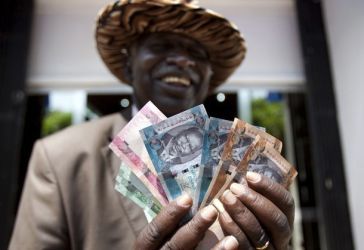South Sudan raises taxes to fill gap in finances
June 8, 2012 (JUBA) – South Sudan said Friday it was increasing taxes and customs duties, apparently in an attempt to fill the gap in the country’s budget deficit after the closure of the oil production earlier this year.

The economies of both countries have been severely affected by the stoppage. South Sudan has responded by introducing wide ranging austerity measures and by trying to expand its non-oil income up from the 2% it stood at the start of the year.
Salvatore Garang Mabiordit, Under Secretary in the Ministry of Finance and Economic Planning said on Friday that the government had “introduced clear and restrictive measures to control public expending.”
He said that financial forms had been provided to all public institutions “not only for administrative purpose but to ensure that public funds are used in an accordance with the financial rules and regulations compatible to the international law”.
South Sudan has struggled to address the issue of corruption since it gained self rule in 2005. This week President Salva Kiir admitted in letters asking senior officials to return stolen funds that over $4 billion was unaccounted for.
Mabiordit lauded council decision endorsing the tax increases on items such as on alcoholic drinks and cigarettes and introduction of customs duties for some luxury goods.
South Sudan’s Council of Ministers have also temporarily stopped importing government cars and re-arranged national priorities, Mabiordit said.
“At the moment, security, development of physical infrastructure, agriculture, health and consolidating peace remains some of the issues drawing attention”, he said.
South Sudan officially became an independent from the neighbouring Sudan in July last year with the hope that independence would bring peace and stability. However, the last 11 months have brought many difficulties to the young country in terms of relations with Khartoum and internally.
Despite having six years of a peace deal to resolve a number of issues South Sudan seceded without the status of contested areas determined or the north-south border demarcated.
As a consequence of the oil shut down South Sudan’s economy is on the verge of collapse, according to leaked World Bank documents published by Sudan Tribune.
Many business groups complained of experiencing difficulties getting hard hold of hard currency, particularly dollars, they need to import goods South Sudan is dependent on from neighbouring countries like Uganda, Kenya, Ethiopia, Central Africa Republic, and DR Congo.
South Sudan’s Consumer Index put together by the National Bureau of Statistics shows that food prices have increased by 80% in the last three months.
Mabiordit praised the government’s efforts to stabilise the economy, which include clamping down on the practice of exchanging hard currency sent through remittances from abroad on the black market.
In May $1 bought 4.5 South Sudan Pounds (SSP) on the black market, compared to SSP 3.7 at the official forex bureau’s.
The government, Mabiordit said, is planning to encourage the South Sudanese Diaspora to transfer hard currency to the their families to increase the amount of hard currency in circulation.
The official also said that UN agencies and international organisations are being encouraged to pay their staff in dollars. “The ministry of labour, public service and human resource development has sent out circular to all of them”, he explained.
(ST)
